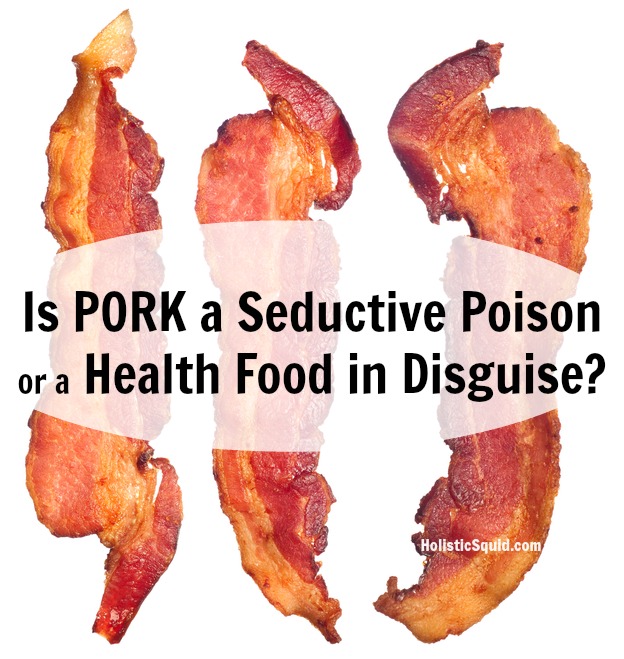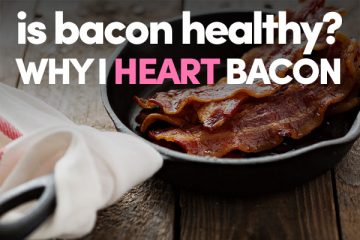
As much as the love for bacon rages in pop culture and beyond, us poor humans have been conditioned to believe a lot of false information about pork: It's high in bad fat; it comes from filthy animals laden with parasites; and it's packed with cancer causing agents – just to name a few. It’s no surprise why so many folks have opted for other forms of meat or even none at all.
But is pork bad for you, really? I'm here to say, bacon (and ham) lovers everywhere can rejoice. As it turns out, most pork myths are wrong or misguided.
Let’s look at six common pork myths. As it turns out, you can have your bacon (and pork chops and ribs and prosciutto) and feel great too.
PORK MYTH #1: All Pork is Created Equal.
All pork products are unhealthy.
The Truth…
A pig raised in a happy and healthy environment is going to yield delicious, nutritious meat – rich in good fats and other nutrients. On the other hand, a pig that’s raised in a place with limited mobility, unsanitary conditions and inadequate food options will produce meat that may taste good, but it will not benefit your health.
Here's why:
Factory raised pork is a bad choice for so many reasons, but nutritionally speaking, factory pork is higher omega-6 fatty acids – specifically arachidonic acid – which the average modern eater already consumes in too high a proportion to other fatty acids. That’s because the diet of factory raised pigs mostly consists of GMO corn and other grains, not the scraps, slop and grasses that a pastured pig is allowed to forage for naturally.
On top of their crappy diet, many factory pigs have a diet supplemented with synthetic vitamins that won’t be properly absorbed, leaving the pigs overfed and malnourished.
Properly raised pigs root around outdoors in the sunshine, and as a result their fat is one of the richest sources of vitamin D. On the other hand, conventional pork pigs don’t spend time outdoors, and their close quarters also mean they’re at a higher risk of contracting diseases. Potential for disease means your future pork will be injected with hormones and antibiotics necessary to keep them alive. (source)
Bottom line: The way pigs are raised greatly determines the nutritional status of the resulting pork.
PORK MYTH #2: Pigs are filthy and toxic.
Pigs don’t sweat and that means they can’t detox. Plus they roll around in their own waste. Nasty.
The Truth
It’s a lesser known fact that pigs don’t have sweat glands. Lots of people think this makes a pig more prone to holding in toxins but that simply isn’t true. Pigs filter out toxins through their liver and kidneys just like humans.
Because they don’t have the sweat glands and can’t pant like dogs do, they need a different way to stay cool. Mud or water puddles help the pigs keep their body temperature down. Plus the mud has an added benefit of protecting their skin from getting sunburned or bitten by insects.
Does this mean pigs are rolling around in their own pee and poo? In this great post, Food Renegade explains that if you take the time to observe pigs, you will find that “like us, they’re conscientious. They won’t wallow in their own excrement. And if you give them water, they will bathe.”
Again, this comes back to the pigs' living conditions. The ones that are given separate areas for waste and mud bathing and given water to rinse off in will be healthier. Pastured pigs raised by responsible farmers fall into this category.
PORK MYTH #3: Pigs have parasites that cause disease.
All pigs have tape worms and eating pork will give you trichinosis.
The Truth
Sure, some parasites are bad, and the thought of wriggly worms inside us can be quite disgusting. To put this into perspective though, parasites are a normal, natural part of life that include all of the tiny bacteria and yeast that – in balance – are essential to health.
In her Ode to Pork, Food Renegade explains, “Very few of the parasites that infect pigs are actually dangerous to humans, and the ones that are bad are radically minimized” by raising the pigs and preparing the pork properly.
Pigs should be raised outdoors, in the sunshine, fed a normal, omnivorous foraging diet to minimize the likelihood of harmful parasites in the first place.
Secondly, pork should always be prepared by first marinating the meat in an acidic medium before cooking.
Historic traditions for preparing pork meat throughout the world included smoking, salt-curing or marinating the meat in something acidic for a period of time before cooking. Usually for 24 hours. A lot of people have abandoned that practice for faster, easier meals and because we have refrigeration to keep meat fresh longer. Thoroughly cooking pork will also eliminate the risk of trichinosis by killing any parasites. Still, I would recommend adhering to traditional preparation whenever possible as one preliminary study shows that these practices also negate blood clotting and inflammation associated with pork consumption.
PORK MYTH #4: Pork causes cancer.
Eating pork will give you cancer, and there are studies to prove it.
The Truth
Studies have shown that there are incidences of some pork being linked to cancer. In particular at Harvard University researchers found “that individuals eating beef, pork, or lamb daily have approximately three times the colon cancer risk, compared to people who generally avoid these products.” (source) I find this China-Study-esque data perplexing because the studies fail to report the sources of the meat consumed, how it was prepared, or what else the subjects were eating (say deep fried doughnuts and coca cola?).
Assuming the participant were eating conventional meat, it's important to note that factory raised pigs will be at greater risk of passing on greater levels of arachidonic acid in the form of the fatty Omega-6. In smaller quantities this acid is essential to muscle growth but in large quantities it can contribute to heart disease.
A pasture-raised pig will not be injected with hormones, antibiotics or other drugs so these potential cancer causing agents won’t be passed on to you. In fact, the meat from a healthy raised pasture pig actually contains more conjugated linoleic acid (CLA), a fat that might actually fight against cancer. According to Eat Wild, “CLA is a newly discovered good fat called “conjugated linoleic acid” that may be a potent cancer fighter. In animal studies, very small amounts of CLA have blocked all three stages of cancer: 1) initiation, 2) promotion, and 3) metastasis.”
PORK MYTH #5: Pork is loaded with heart-damaging fat.
Pork is high in saturated fat that will give you heart disease and kill you.
The Truth
As we discussed above, factory pork will be high in omega-6 fatty acids which is linked to heart disease and other health problems when consumed out of proportion from other fatty acids.
Thankfully, pastured pork is a great source of essential, healthy saturated fat, which, despite common modern beliefs, is actually essential to health.
Have you read this great article by the heart surgeon who speaks out on what really causes heart disease? Turns out butter and bacon are not to blame after all.
Diets high in saturated fat actually have been shown increase HDL, the “good” cholesterol and not affect LDL, the “bad” cholesterol (Journal of American College of Nutrition, 2004). Cholesterol does not clog arteries, and is essential for many functions in the body, including hormone production and regulation, proper digestion, and immune health. A fairly recent study actually shows that lowering cholesterol has no affect on plaque build-up in the arteries (American Journal of Cardiology, 2003).
According to Dr. Mercola, “Your body cannot function without saturated fats. Saturated fats are needed for the proper function of your: cell membranes, heart, bones (to assimilate calcium), liver, lungs, hormones, immune system, satiety (reducing hunger), and genetic regulation.”
Yay, pork belly!
PORK MYTH #6: Pork is loaded with nitrates and nitrites.
Nitrates and nitrites are a leading cause of disease, and pork products are loaded with them.
The Truth
Nitrates and nitrites are words many people will associate with bacon, processed meat, and hot dogs. The fact is that more nitrites come from vegetables than you might think. “One serving of arugula, two servings of butter lettuce, and four servings of celery or beets all have more nitrite than 467 hot dogs.” (source)
Studies have been conducted over recent years showing that, not only do nitrites live in our own saliva but that there may even be benefits to ingesting them for treating certain heart related diseases. That said, not all nitrates are created equally, and meats cured with sodium nitrate (a.k.a.) salt peter, sodium nitrite, or mono-sodium glutamate (MSG) should be avoided because they turn into a carcinogen in the body.
Pork products labeled as ‘uncured' are often still preserved according to traditional means, so they are preferred even though they will contain naturally occurring nitrates. You can read more about how to properly prepare pork in this Definitive Guide to Pork.
One last thing…
I subscribe to the 80/20 principal which means I aim to follow the best practices of healthy living 80% of the time. My family eats mostly home cooked meals. During the remaining 20% I still try to eat healthy but I try to lighten up and not be so darn fussy. Afterall, health is not just what we put in our bodies, but also our psycho-emotional state as well. Food obsession is both exhausting and stressful.
Is pork bad for you?
As you can see, the answer to this question depends on a few key points. So whether or not you choose to eat pork, here's what you need to remember:
- Know your farmer and buy pork from properly raised pigs.
- Prepare your pork properly using traditional methods whenever possible (marinated or traditionally pickled or cured).
- Enjoy your bacon (ham and pork chops). Because to do otherwise is just a darn shame.












Thank you for the clarification about natural vs. unnatural nitrates/nitrites! I had read somewhere that nitrates/nitrites are naturally occurring in vegetables so it’s fine to eat bacon containing it. Now I want to ask my local farmer if they produce bacon! My husband and I are in love with bacon, but I’d like to find a healthier version of it. 🙂
I bought good bacon from our all natural grocery store last week. My husband was a little surprised by the price and then he ate it. I made him a believer. So delicious! It’s nice to feel good about what I am feeding my family. I wish it were easier to do when funds are low.
I don’t get the current bacon craze. My husband is in love with it, in fact I think he owns http://www.baconisgood.com. But just the smell turns my stomach. Maybe I’m still clinging to my childhood ideology that considered pork “unclean” but one of my employees’ pastor witnessed a wild boar eating a human carcass while doing work in Africa. Yes it’s now 3rd degree hearsay, and a wild boar in Africa is different than conscientiously-raised pork here but I can’t get over the idea that pigs are scavengers and as such should be avoided. Also, it is very uncommon for humans (and actually all omnivores and carnivores) to eat animals that are not herbivores, the pig being the notable exception. There must be some evolutionary reason for this, right? So for me, even though the science says its okay, my instincts or sensitivities or something like that keep it out of my kitchen. Which means my poor husband gets his at the greasy spoon diner in town, probably the worst quality out there!
If it makes you feel any better, free range chickens are also scavengers. They eat insects, worms, and even baby mice. I have even seen mine eat a dead snake. Many fish are also scavengers. I don’t see what the big issue with scavengers is.
I think that your theory on omnivores and carnivores eating only herbivores is incorrect. Chickens and turkeys will eat anything…. including each other, mice, toads, anything. I’ve seen it. Nobody considers them ‘unclean’. Many fish also eat other living animals along with plants. Why are they not unclean and to be avoided. It’s unfortunate that you’ve cut an entirely good, healthy option out of your diet because of someone’s “guess what I saw” story. Hawks, eagles etc. will eat a cat as soon as a rabbit. Coyotes will eat dogs, cats, anything they can kill. I realize that in the US it’s not normal for humans to eat carnivores, but there are countries in the world where eating dog and cat are not uncommon at all. ‘We’ also think it’s weird to eat horse… why – they are herbivores. Talk about grass-fed. I don’t expect to see a movement here anytime soon to start eating horse, but I would hope that people would educate themselves on the differences in pork and realize that it is not pork that is ‘bad’, it’s what humans feed them and how they raise them that should make us think twice about where our bacon comes from. While we’re at it, we should take a close look at the chicken that is factory farmed also. I’m guessing if you saw those conditions you’d cut chicken out in no time flat.
Yes, I thought more about it and did think of some other examples, including chicken. No wonder I can’t stand chicken!! Ha ha!
I’m with you Jessie. To me pork is unclean. For me it is because He who created me and them said so. I have no problem with others who choose to eat it. We each make our own choices. Horse, while a grass eater, is unclean because it does not have a split hoof and does not chew it’s cud. Fish who are scavengers do not have scales, therefore unclean as well. Much of the clean and unclean deals with the digestive system itself. Grass eaters that chew the cud have a much more efficient and thorough digestive systems. Pigs, like humans, are less efficient and store toxins in the fat making them more prone to toxin overload and disease. Pigs are similar in many ways to humans thus they are often used in research for human disease. We also share many diseases. Influenza is often harbored in the lungs of pigs. If bits of this end up in sausage it can be spread to humans. Pork also contains high levels of histamines, imidazole compounds and growth hormone which can cause itching and inflammation. It also contains sulphur containing mesenchymal mucus which leads to swelling and deposits of mucus in tendons and cartilage, resulting in arthritis and rheumatism.
Sulphur from pigs helps cause firm human tendons and ligaments to be replaced by the pig’s soft mesenchymal tissues causing degeneration of human cartilage. Some who have problems with arthritis have had relief from cutting out pork. Changes in red blood cells has also been documented after eating pork. And as mentioned in another post, parasites in pork is a big concern. Some of which are not killed by heat.
I love bacon too but after years of research, I found the data supports the instructions of my Creator. Thus I no longer consume pork. I have however found beef bacon and find it even tastier than pork bacon. If you know how to smoke meat you can even make it yourself. One tip if you are concerned about nitrates and nitrites, Vitamin C helps to neutralize them. If you do periodically eat them take vitamin C with it.
Interesting perspective. You do; however, realize that exact same Creator turned around and deemed ALL meat “clean” in the new testament, right?
I was going to explain this to Gay but you said it right, short and to the point.
what if this person is Jewish or is a Muslim? (Sounds more like a Muslim to me but) Both these types of groups don’t follow the New Testament
I do not allow pork brought into my home. We do not eat it nor touch it. Swine contain up to 100 different diseases. There is science that says not to eat it. Would you eat a vulture or one of the dragons on Galapagos Islands? Same thing as eating pig.
I cannot even tell you how nauseated and sick I get when I smell it cooking in a cafe or restaurant.
emily,
great post! the one thing i remember from researching parasites (years ago when i did a parasite cleanse) was the the pork tapeworm (or its eggs) is not killed by heating, whereas when cooking other meats, if you have high enough heat you can kill the parasites. i am not talking about trich. but specifically the pork tapeworm.
it’s been a while though since i read about this and i can’t remember details. do you have any info?
thanks
alexis
This is false. Cooking kills all parasites and eggs.
Hi Alexis, thanks for the question. You can read up about it here: http://en.wikipedia.org/wiki/Trichinosis. But the summary is: Larvae may be killed by the heating or irradiation of raw meat. Freezing is only usually effective for T. spiralis, since other species, such as T. nativa, are freeze resistant and can survive long-term freezing. All meat (including pork) can be safely prepared by cooking to an internal temperature of 165°F (74°C) or more for 15 seconds or more.”
First I must admit that pork is not my meat. Then again beef was not either for 15 or so yrs till finding pastured grass finished beef. We raise our own beef, chickens, turkeys, and pigs. All on the pasture. Everyone always comments on how good it is. The pigs are awesome at clearing land! We actually did not feed ours for months and they grew and grew eating grubs and whatever was in the pasture. They are very clean buggers. They used to bathe in the water trough after playing in the mud. When we butchered our sows our hog decided he was lonely and broke out to join the cows. It was quite cute.
Thankyou for this post.
We eat only pastured pork that we by by the side (1/2 a pig) from a local producer. We do eat the bacon that comes as part of the deal as well.
it is the most wonderful pork I have ever eaten.
Pigs are lovely friendly, and very clean creatures, but they are also very tasty as well.
I am with Dorothy and Gay–100%!
OMFG! Way to ruin a food blog – bring your stoopid superstitions here and argue them for pages and pages.
Laughable.
Hey, Squid – great post. Buying a large piece of pig for dinner. Considering a 1/2 pastured pig.
Thanks, love your blog.
What a wonderful post! I’ve always been on the fence about pork. We have great access to pastured pork thank goodness. And I love your 80/20 rule! We follow that too!
Two very small corrections.
1) Pigs do have some sweat glands, just not very many.
2) Pigs can cool themselves by panting and they do this.
We have about 400 pigs out on pasture at our family farm in the mountains of Vermont. Their preference is to use a good wallow and shade for cooling off but when they must they’ll pant to cool themselves. They also enjoy ice and snow for cooling.
Thanks for correcting the myths.
I definitively love my bacon and only wish I could find a better source than modern supermarket bacon. Lately, I’ve been buying pancetta out in Italian stores in hopes that they treat their pigs better.
I did want to mention a concern I had about one of your quotes. You quote Chris Kessler’s website here: “The fact is that more nitrites come from vegetables than you might think. “One serving of arugula, two servings of butter lettuce, and four servings of celery or beets all have more nitrite than 467 hot dogs.” (source)” But you didn’t check Chris Kessler’s sources. I researched this a few months ago when someone was posting about how Nitrates are just fine for you, but Chris Kessler cites a completely random blog who in turn misquotes a study. I read through the study and the foods and the figures just don’t match up. Granted, there are nitrates in our vegetables, but I’d highly suggest finding a better source to cite.
Wow the things people will say in order to serve their own agenda… Enjoy don’t forget the heart disease while you’re at it. This piece is a fun read. http://www.vice.com/read/dont-eat-those-carnitas-0000325-v19n9
But where can I get healthy pastuered pork???
Hi Natalie,
The best place to get healthy pastured pork is from your local farmer – depending on where you live. Otherwise, you could also contact US Wellness Meats.
if pigs had no way of detoxifying themselves… wouldn’t they, like all other living organisms, die of intoxication?
I have never ate pork willingly in my life.
From time to time I get pork from restaurants inadvertently . A little sausage mixed in with the beef, some bacon in a dish and other things. Its very hard to eat out and not get porked from time to time!
Since I grew up never eating it, my stomach won’t tolerate it. and almost instantly my body rejects it.
Or at least it gets very upset with me.
I just found this post–very enlightening. I had never heard of the practice of marinating pork in an acidic medium before cooking. Would that include bacon?
Hi Nancy, yes, this would include bacon. xoxo Emily